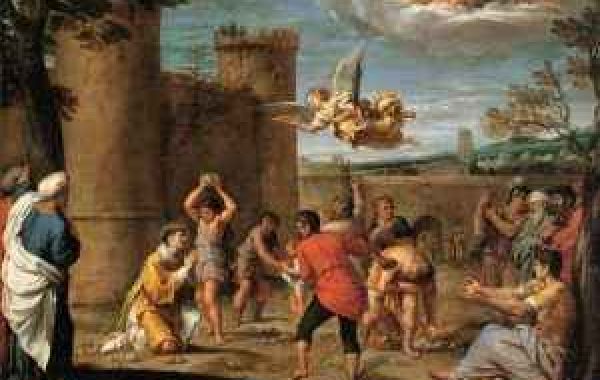We want to take a closer look at a subject that most Christians do not like to talk about, and that is persecution and martyrdom. Actually, persecution of the Truth goes all the way back to the prophets. Yeshua said that the world hated Him and that it would hate us too because we are His followers. He said that they would kill Him and likewise, kill us too. So we want to look at this subject because it plays such an important role in our lives as Christians. Christians in America have not yet been persecuted to the point of death, but we see that the rights of Christians have slowly been taken away; and as the tensions grow from year to year and the hatred mounts against Israel and America, one has to ask themselves, “Will the persecutions in this country ever get to that point? Will the words of our Messiah come true for us here in this country?” So we want to look at the history of persecution starting with the disciples to see if there is any correlation between them and the church today and how they responded to it.
The Martyrdom of the Disciples
A good book to read on this subject is Fox’s Book of the Martyrs. It’s here that we find the persecution and deaths of the twelve disciples. Now we know that Yeshua mandated to His disciples to go out and preach the Word. In Luke 24 it is written that the repentance for the forgiveness of sins should be proclaimed in His name to all nations, beginning from Jerusalem; and so we see in the Book of Acts that the disciples did just that. On the day of Pentecost, Peter stood up and preached the message of repentance to the crowd and 3,000 people accepted the offer to repent and accept Yeshua as the Messiah. Can you imagine what a day that was for the disciples? These cowardly men who hid themselves behind closed doors receive the Holy Spirit and now they are empowered and boldly they begin to preach the truth of salvation and they see that their message is received and this great harvest of souls is gathered in that day. What were they to think except that maybe life was going to be good?
But that was short lived. One day when Peter and John went to the Temple for Morning Prayer, there was a lame man at the gate called Beautiful, and when he asked the men for money, they instead gave him something more precious than silver and gold: they healed the man in Yeshua’s name. When the people saw this, they all gathered around Peter and John, who began telling the story of salvation. 5,000 people repented that day and were brought into the fold. But this time it was at a cost. The priests and the captain of the Temple guard along with the Sadducees (who did not believe in the resurrection) arrested them and put them in jail.
The next day, Peter once again gave the message to those of the Sanhedrin; they could not dispute the miracle, so they told Peter and John to never again speak or teach in the Name of this Yeshua or else they would be punished. Peter replied, “Whether it is right in the sight of God to listen to you more than God, you judge.” Now Peter said this because the Word of God tells us to obey our authority, and the Sanhedrin was equated to the seat of Moses. Yeshua tells the multitude and His disciples in Matthew 23:2-3, “The scribes and the Pharisees sit on the chair of Moses; therefore whatever they tell you to obey, obey and do it, but do not do according to their works, for they say and do not.” Peter continued, “For we cannot but speak the things we have seen and heard.” This is what Yeshua meant when He said, “You shall be My witnesses (The word witness from the Greek is martus or martur, “one who bears witness by his death,” one who can, or does, claim what he has seen or heard or knows. This places a different light on what most Christians think of when they use this word).”
When they reported back to the believers, they responded with, “O Lord, it is You who made the heaven and the earth and the Sea, and all that is in them, who by the Holy Spirit, through the mouth of our father David Your servant said, ‘Why did the Gentiles rage, and the peoples devise futile things? The kings of the earth took their stand, and the rulers were gathered together against the Lord, and against His Messiah.'” And after they prayed, the place where they had gathered together was shaken, and they were all filled with the Holy Spirit, and began to speak the Word of God with boldness. And so the believers grew in number daily and they continued in prayer and study of the Word and many signs and wonders were being done among the people; and they were esteemed highly, for many people who were sick were healed, some just by the passing of Peter’s shadow. Can you imagine the power of the Holy Spirit when believers walk by the Spirit and not by the flesh?
But persecution always finds its roots in the testing of our faith. The High Priest and the Sadducees, filled with jealousy, put the apostles in jail. But it was God to the rescue, for Scripture tells us, “God is an ever present help in the time of trouble.” An angel came that night and opened the gates of the prison and told them, “Go, stand and speak to the people in the temple the whole message of life.” And so the apostles continued in their mission of preaching and teaching the Word of Life.
Stephen
We know in the Book of Acts that Stephen was the first martyr. Scripture tells us that Stephen was preaching the gospel and his listeners were so outraged that they drove him out of the city and stoned him. What could Stephen have said that would have caused the people to be in such a rage that they would kill him? Well let’s take a closer look.
The Book of Acts records in chapter 6 that Stephen was full of faith, filled with the Holy Spirit, doing great wonders and signs among the people. There arose some men from the synagogue of the Freemen. Now, this is the same synagogue that Saul, who became the Apostle Paul, attended and they began disputing with Stephen but they could not resist the Holy Spirit’s wisdom for by which Stephen spoke. So what did he say that caused them to bring him before the council? Well, we get a clue from 1 Corinthians 1:18-31 why they reacted the way they did from one who was there: “For the word of the cross is to those who are perishing foolishness, but to us who are being saved it is the power of God. For it is written, ‘I will destroy the wisdom of the wise, and the cleverness of the clever I will set aside.’ Where is the wise man? Where is the scribe? Where is the debater of this age? Has not God made foolish the wisdom of the world? For since in the wisdom of God the world through its wisdom did not come to know God, God was well-pleased through the foolishness of the message preached to save those who believe. For indeed Jews ask for signs, and Greeks search for wisdom; but we preach Messiah crucified, to Jews a stumbling block, and to Gentiles foolishness, but to those who are the called, both Jews and Greeks, Messiah the power of God and the wisdom of God. Because the foolishness of God is wiser then men, and the weakness of God is stronger than men. For consider your calling, brethren, that there were not many wise according to the flesh, not many mighty, not many noble; but God has chosen the foolish things of the world to shame the wise, and God has chosen the weak things of the world to shame things which are strong, and the base things of the world and despised, God has chosen the things that are not, that He might nullify the things that are, that no man should boast before God. By doing this you are in Messiah Yeshua, who became to us wisdom from God, and the righteousness and sanctification, and redemption, that, just as it is written, ‘Let him who boasts, boast in the Lord.'” So we see that by the very nature of Stephen’s message he put these people to shame.
So they brought Stephen before the council and there it is said that they looked upon him and saw his face as the face of an angel. Stephen begins his defense by giving them a history lesson, and how their history led Israel to the condition they were in at the moment. You see, this is true of all people. We can accept where we have been, but we cannot accept where we are today. Stephen tells them that they are stiff-necked and uncircumcised in the heart. Their ears are not open to hear God and they resist the Holy Spirit. When they hear this, they were cut to the heart and became furious. Unfortunately, they were not cut to the heart so that they rended their hearts and repented, but instead they rended their garments and became furious to the point that they dragged him off and stoned him to death. So heaven opened up and received Stephen, but as he was dying he asked God to forgive them of their sins.
Now Paul, who stood by and held the cloaks of those who stoned Stephen, I’m sure remembered all that happened that day when in Rome they began disputing with him. He quotes Isaiah, “Go to this people and say, ‘You will keep on hearing, but will not understand; and you will keep on seeing, but will not perceive; for the heart of this people has become dull, and with their ears they scarcely hear, and they have closed their eyes; lest they should see with their eyes, and hear with their ears and understand with their heart and return, and I should heal them.'”
The Apostles
Ten years after the death of Stephen, we encounter our next martyr. In the Book of Luke, we find James the son of Zebedee, the elder brother of John. Herod Agrippa, who had just become the governor of Judea, wanted to make a name for himself, so he decided that he would strike down the leadership of the Christians, this being James; but God used this tragedy for good. Clemens Alexandrinus writes that James’ accuser repented and fell down at his feet to request his pardon, professing himself as a Christian and that James should not receive the crown of martyrdom alone. So they both were beheaded at the same time. And so Yeshua’s prophetic remark to James and his mother Salome were fulfilled that He would drink of the same cup as Yeshua (Matthew 20:20-23).
Philip, the first one to be called a disciple, brought the message of repentance unto salvation in Asia. There he was martyred at Heliopolis, in Phrygia. He was scourged, thrown into prison, and then crucified in A.D. 54.
Matthew the tax collector, who wrote his gospel in Hebrew which afterward was translated into Greek by James the Less, went to Parthia and Ethiopia, was martyred in the city of Nadabah, being slain with a halberd in A. D. 60.
James the Less was elected to be the overseer of the Jerusalem Church and the author of the epistle that bears his name. At the age of 94, he was beaten and stoned and clubbed by the Jews.
Matthias, who was appointed to replace Judas as the twelfth apostle, was stoned and beheaded in Jerusalem.
Andrew, the brother of Peter, preached the gospel in Asia. He was crucified at Edessa. The two ends of his cross were fixed transversely in the ground (X) and this became known as the St. Andrew’s cross.
History records that Mark was a convert to Christianity. He wrote his message of salvation under the watchful eye of Peter, who supposedly was the one who led him to Yeshua. Mark was dragged to pieces by the people of Alexandria, at the great solemnity of Serpis their idol.
Jude was the brother of James and was called Thaddeus. He was crucified at Edessa in the year 72.
Bartholomew translated Matthew’s gospel into the Indian language. He was cruelly beaten and then crucified.
Thomas, called Didymus, preached the gospel in Parthia and India. After exciting the rage of the pagan priests, he was martyred by being thrust through with a spear.
Luke, the evangelist, wrote his message of truth that bears his name. He traveled with Paul in various countries. Tradition has it that he was hanged on an olive tree by idolatrous priests in Greece.
Barnabas was a Jew from Cyprus and tradition has it that he died in 73.
Simon preached the truth in Mauritania, Africa, and Britain in which he was also crucified in 74.
John the Beloved was the brother of James the Great. The churches of Smyrna, Pergamos, Sardis, Philadelphia, Laodicia and Thyatira were all founded by him. He was sent to Rome from Ephesus where he was supposedly cast into a pot of boiling oil. He escaped miraculously without injury. He was then banished to the Isle of Patmos, where he wrote the Book of Revelation. He was later recalled back. He was the only apostle who escaped a violent death.
Peter was crucified head down in Rome, though many asked him to flee the city because Nero sought after him. When Peter began to flee the city, he got as far as the city gate when Yeshua appeared to him. Peter asked, “Lord where are you going?” and Yeshua said, “I have come again to be crucified.” Peter, understanding his suffering, returned to the city. He asked to be crucified upside down because he was not worthy to die like his Savior.
Paul also suffered death at the hand of Nero. Paul suffered great persecution at the hand of those who did not want to hear truth. But Paul said, “We are afflicted in every way, but not crushed; perplexed, but not despairing; persecuted, but not forsaken; struck down, but not destroyed; always carrying about in our body the dying of Yeshua, that the life of Yeshua also may be manifested in our body. For we who live are constantly being delivered over to death for Yeshua’s sake, that the life of Yeshua also may be manifested in our mortal flesh. So death works in us, but life in you. But having the same spirit of faith, according to what is written, ‘I believed, therefore I spoke,’ we also believed, therefore we also speak; knowing that He who raised Yeshua will raise us also with Yeshua and present us with you. For all things are for your sakes, that the grace which is spreading to more and more people may cause the giving of thanks to abound to the glory of God. For momentary light affliction is producing for us an eternal weight of glory far beyond all comparison.” Paul was beheaded, but upon his death he knew that there awaited for him a crown of righteousness because he had ran the race and won!







